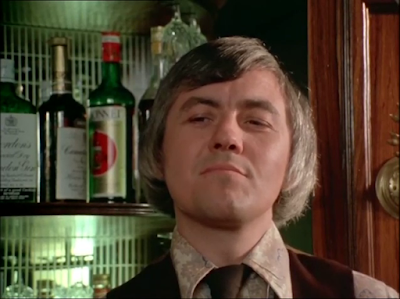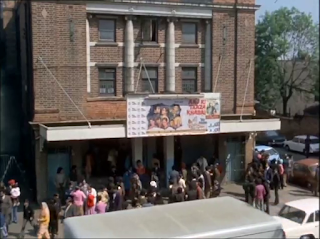All I want is out of this bastard second city of his,
I’ve done time for his brother, either we call it quits or I’ll kill him or any
more of his bleedin’ men he sends to get me…
This has been on my watch list for some time now, partly
because of its reputation but also because Dave Greenslade wrote the score and
the main theme features on Greenslade the bands LP, Time and Tide as well as a
single version with Dave’s former Colosseum bandmate, Chris Farlow on vocals.
This version was concocted for the TV series that followed in 1976 and which
ran for two series, watching this original TV film, part of the Play for Today
series, there are so many characters and ideas here, you can well understand
why there was room to expand the tale.
Directed by Philip Saville, Gangsters was written
by Philip Martin who also featured as the main gangster, Rawlinson a nasty
piece of work he clearly relished creating and performing. There’s something of
the swagger and violence of contemporary American cinema as if Dirty Harry and
Popeye Doyle had been transferred to Birmingham and the city is very much one
of the stars along with its culture.
The film is a real slice of Brummie life and starts in a
nightclub with two comics, Rolf Day and Mohammed Ashiq swapping what would now be considered
unacceptably racist jokes – white, black, brown and Irish - and yet there’s
warm applause and laughter from the extras spotting the observational foundations
for their jokes. Five years later I’d be a young student working summers in
Butlins and these kinds of jokes were still part of the acts for many on the
circuit.
 |
| Philip Martin |
There’s also a number of inserts featuring proto-Bollywood
films – Sharmeelee, a 1971 Indian Hindi-language romantic film - and
other representations of cultural diversity; Birmingham as one of the most racially
diverse cities in Britain at the time and where, unlike some, there was more
mixing, so far as this went. Here there’s criminal operations based on these
different cultures and sometimes they work together to maintain the peace. That
said the story directly addresses illegal immigration with Rafiq (Saeed Jaffrey)
a “reluctant” community leader answering a TV interviewer’s questions about a
supposed “Pakistani mafia” and accusing politicians of ramping up a distorted
narrative about immigration even as he is shown to be a major player in people
smuggling.
He's seen in cosy conversation with Rawlinson celebrating
his gaslighting before handing the latter’s girl, Anne (Elizabeth Cassidy) a
bag of heroin brought in along with some men, from Pakistan. There’s an uneven peace.
The action centres around John Kline (Maurice Colbourne),
an ex-SAS soldier, recently released from a four-stretch, after doing time for
a job for Rawlinson and who now wants his share of the loot. Unfortunately,
Rawlinson blames Kline for the death of his brother Brian and so there’s no easy
compromise possible even if Kline sees his debt as paid by taking the jail
time. He goes to a café and is approached by a man called Khan (Ahmed Khalil)
who claims to be looking for a relative who had been taken from Rotterdam to Britain…
thinking he’s from Rawlinson, he throws him to the ground, but there’s more to
Khan than meets the eye.
Kline goes to the Maverick Club, a delightfully dingy
bar/strip club where he meets the manager, old “friend” Dermot Mcavoy (Paul Antrim),
who greets him as warmly as he can, as he pours him a strong one and encourages
him to watch his new stripper, Dinah (Tania Rogers), rehearse, an almost
transcendental experience for the man who hasn’t drunk for years nor seen a
woman outside of prison let alone her clothes. There’s tension in the air as
Dermot tells him he hasn’t got the money and Kline measures Dinah’s every
contour as she looks him straight in the eye… racy stuff for TV in the mid-seventies.
Khan goes to the crime boss to tell him about Kline’s
release only to find he already knows: I know everything in this city me…
and how to profit from it. He’s trying to ingratiate himself with the mob
working also with Rafiq’s right-hand man Kuldip (Paul Satvendar) as well…
Dermot promises to get Kline’s money and sets him up with
Anne for a romantic treat on her canal boat but organising beating at the hands
of handy scouse henchman Malleson (Paul Barber) and his compadres. Kline’s no
mug though and repels Anne and then Malleson’s mini mob. He goes straight back
to the club to confront Dermot as Dinah entertains an authentically sleazy
looking crowd (I should imagine). How many times have we seen such confrontations
of masculinity in showgirl settings… it’s the law of the jungle and Kline’s
bite is far worse than the others’ bark.
So it goes as, in Get Carter style, the violence
and the stakes escalate as does the romance between Kline and Dinah, how many
mixed-race couples were seen on screen at this time? It was certainly one of
the bolder decisions of the production and importantly gives Kline someone to
protect and raises his stakes in this fight to the end with Rawlinson and
pretty much every gang in town.
DustyVerdict: Gangsters feels both of its time but
also still fresh, the buildings and the suits may have changed in Birmingham,
but the crimes remain the same there and elsewhere made so much worse by the
influx of new drugs and new weaponry. Philip Martin, who had never been to the
city before spent three months immersing himself there and meeting with local
criminals to understand the locality and its issues. Maybe only an outsider
could paint the picture he does, I don’t know Birmingham that well and
thankfully only have limited experience of Liverpool – where my father was a
policeman – and London.
Discussing the film with Billy Smart of the Forgotten
Television Series website in 2020, Philip Martin said that after some pushback
from various dignitaries from the city “… the same week there were fifteen
illegal immigrants caught in the Bristol Channel on the way to Birmingham and
the Scratchwood Services which had a two million pound heroin heist picked up
by the police. So, we just said, ‘well, read the papers. We don’t need to
justify ourselves.’”
Ultimately Gangsters was part of a wave of more realistic fiction that balanced its concerns with rich characters and essentially human stories… the con men are still in charge, and we’re all still being lied to by the Rawlinsons and the Rafiqs, some of whom are closer to political power than we’d like. Do gangsters exist? Yes, and they’re all a bit like this.
Tip of the hat to for Birmingham’s “Three Degrees” … Earlene
Bentley, Ethel Coley and Joanne White who sing in the nightclub. I can, almost,
remember venues like these.
Next up I must watch the TV series, two quite differing sets of six episodes by all accounts the second being what Kim Newman describes as “one of the damnedest things ever shown on UK TV”.
The full interview with Philip Martin is available at the Forgotten Television Drama website which is highly recommended!











No comments:
Post a Comment